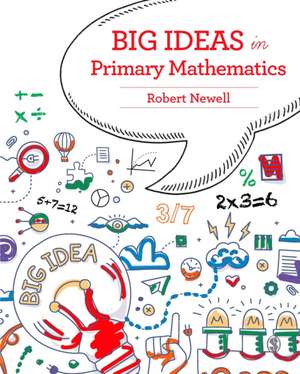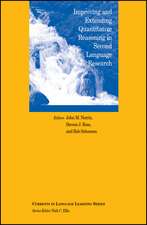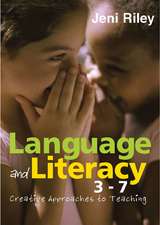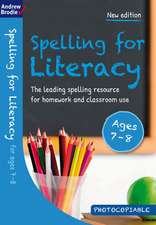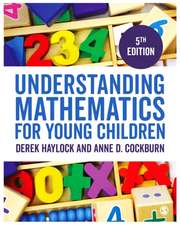Big Ideas in Primary Mathematics
Autor Robert Newellen Limba Engleză Paperback – 27 noi 2016
This book explores the ‘big ideas’ in maths to help trainee teachers confidently teach the curriculum in a way that engages children and focuses on understanding, rather than memory, for those lightbulb moments.
Covering the major concepts in simple terms, whilst carefully linking to the National Curriculum, it shows how they can be used to enable learning and support mathematical mastery.
A focus on explaining misconceptions and errors will strengthen trainees and teachers own mathematical subject knowledge, while also giving them the confidence to deepen their understanding of the children they teach.
Key topics include:
- Problem-solving, reasoning and developing fluency in maths
- Place value and counting systems
- Measuring money, time and weight
- Geometry, and understanding space and shape
- Fractions and statistics for the primary classroom
Robert Newell is a tutor in primary education at the UCL Institute of Education, London.
| Toate formatele și edițiile | Preț | Express |
|---|---|---|
| Paperback (2) | 253.86 lei 3-5 săpt. | +26.47 lei 7-13 zile |
| SAGE Publications – 28 apr 2021 | 253.86 lei 3-5 săpt. | +26.47 lei 7-13 zile |
| SAGE Publications – 27 noi 2016 | 524.31 lei 39-44 zile | |
| Hardback (1) | 793.99 lei 6-8 săpt. | |
| SAGE Publications – 5 mai 2021 | 793.99 lei 6-8 săpt. |
Preț: 524.31 lei
Preț vechi: 647.29 lei
-19% Nou
100.33€ • 107.28$ • 83.65£
Carte tipărită la comandă
Livrare economică 14-19 aprilie
Specificații
ISBN-10: 1473913179
Pagini: 320
Dimensiuni: 186 x 232 x 21 mm
Greutate: 0 kg
Ediția:First Edition
Editura: SAGE Publications
Colecția Sage Publications Ltd
Locul publicării:London, United Kingdom
Recenzii
Beginning teachers looking to build their subject knowledge and confidence in teaching mathematics will find this book invaluable. It uses the exploration of ‘big ideas’ to guide the reader through the trickier areas of the mathematics curriculum, building understanding to allow beginning teachers to explain key ideas, model mathematical reasoning and address errors and misconceptions with confidence.
For non-specialists, the focus on explaining misconceptions and errors will strengthen their own mathematical subject knowledge, while also giving them the confidence to deepen the understanding of the children they teach.
The perfect book for anyone studying primary mathematics on initial teacher education courses, including undergraduate (BEd, BA with QTS) and postgraduate (PGCE, PGDE, School Direct, SCITT) routes, and also NQTs. Clearly written, it's a book that can be dipped into at any stage of teaching, giving practical advice and reassurance.
Cuprins
Chapter 1: Problem solving
Chapter 2: Mathematical understanding in the early years
Chapter 3: Place value
Chapter 4: Addition and subtraction
Chapter 5: Multiplication and division
Chapter 6: Time
Chapter 7: Algebra
Chapter 8: Fractions
Chapter 9: Statistics
Chapter 10: Geometry: Shape and space
Chapter 11: Measurement
Descriere
Notă biografică
Robert Newell has worked at the Institute of Education (IOE) for 17 years; full time for the last eight. He works with Primary PGCE (Postgraduate Certificate in Education) trainees and Teach First participants. His career started as a primary school teacher, taking responsibility in maths in several schools before progressing to two deputy head posts and then a headteacher role.
Primary maths teaching, though, has been his biggest passion. He has worked as a numeracy consultant and also delivered a PGCE Maths programme to a London SCITT (School-Centred Initial Teacher Training centre) for three years. He is now part of a small maths team serving several hundred trainees at the IOE, now merged with UCL (University College London). He has two passions that underpin his work. One is ensuring that primary maths children are taught in a way that engages them and focuses on understanding. The other is the belief that, in the main, it is only anxiety that stops more trainees feeling comfortable about teaching maths. Part of his working role at the IOE is linked to supporting trainees with less secure understanding and allowing them to see how much they can offer. Many realise that although anxiety has affected their self-perception about mathematical understanding, this process can be reversed.
His dissertation focused on the different ways trainee teachers can learn to use different levels of understanding effectively in their primary school maths teaching. His writing and work in recent years have focused primarily on empowering trainees and new teachers to fulfil their potential whatever their disposition is or their journey has been. Here, he commits to print a range of ideas and activities, refined over many years and linked to ensuring all primary teachers can teach for understanding. In this edition, his recent work in analysing the mastery approach to teaching maths supports the articulation.
